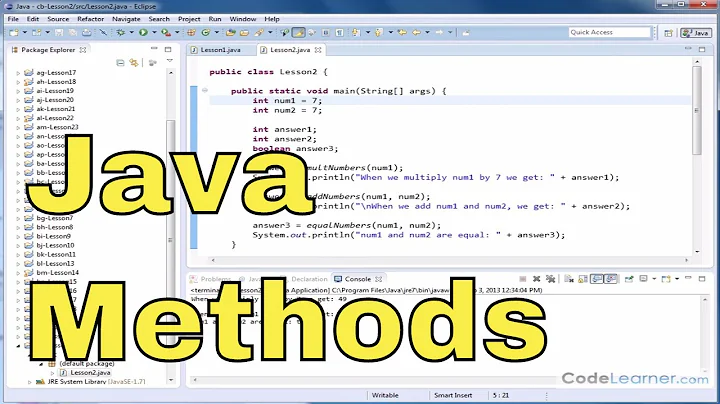String... parameter in Java
Solution 1
It's called varargs; http://docs.oracle.com/javase/6/docs/technotes/guides/language/varargs.html
It means you can pass an arbitrary number of arguments to the method (even zero).
In the method, the arguments will automatically be put in an array of the specified type, that you use to access the individual arguments.
Solution 2
Yes, that means you can take arbitrary no of Strings as an argument for this method.
For your method:
public void method(String... strs);
You can call it as:
method(str)
method(str1, str2)
method(str1,str2,str3)
Any no of arguments would work. In other words, it is a replacement for:
public void method(String[] str);
Solution 3
It's called an ellipsis and it means the method can take multple Strings as its argument.
See: The Java tutorial on passing arguments on Oracle's site.
Solution 4
See java optional parameters : as of Java 5, Java has support for variable numbers of arguments.
Related videos on Youtube
Desh Banks
Updated on August 28, 2020Comments
-
Desh Banks over 3 years
I have to implement an API for a homework assignment, and my instructor has used a notation I am unfamiliar with for one of the methods in the API (javadoc based).
public void method(String... strs);What do the '...' mean? It later looks like I'll need to call this same method using a single string actual parameter, as well as multiple string actual parameters...
Java doesn't have optional arguments (to my knowledge), so I am a little confused here...
-
Brian Roach over 12 yearsUh, no, it doesn't (you're half correct - your first sentence is the problem).
-
Johnydep over 12 years@BrianRoach, Oh yes sorry you are right :)
-
Kennet over 12 yearsHaven't found a max limit of how many arguments varargs can take, but it's definitely more than three
-
Desh Banks over 12 yearsAh, thanks for the quick response. I hadn't seen this before... Very nice.
-
Brian Roach over 12 years+1 for coming back and fixing it.
-
Desh Banks over 12 yearsThanks for the example. Upon knowing about 'varargs' I've also found that the vararg argument must be the final formal parameter declared in the parameter list of the function using varargs.
-
 amphibient over 10 yearsI would just add that this type of function is called variadic: en.wikipedia.org/wiki/Variadic_function
amphibient over 10 yearsI would just add that this type of function is called variadic: en.wikipedia.org/wiki/Variadic_function








